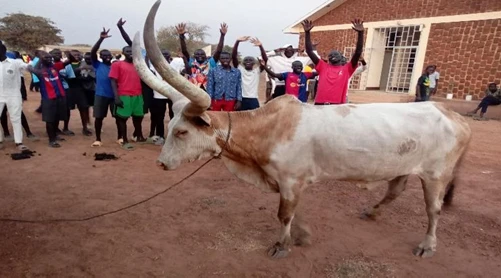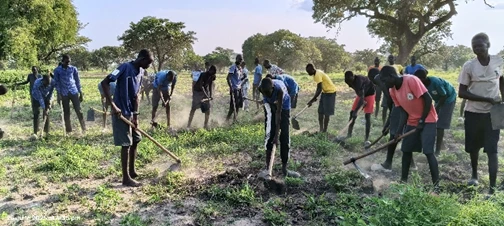In the midst of the devastation of war and poverty in South Sudan, an educational oasis of hope rises, thanks to the solidarity fostered by the La Salle Foundation of the Brothers of the Christian Schools (Lasallians).
the school The Rumbek Rooma Lasallian project started in 2018, trains adolescents between 14 and 17 years old. The first class of students had 23 students; Today they number close to 500.
Receive the main news from ACI Prensa by WhatsApp and Telegram
It is increasingly difficult to see Catholic news on social media. Subscribe to our free channels today:
Students and parents of Lasallian study centers in Mexico they have committed to donate 350,000 pesos, about 19,000 US dollars.
South Sudan and a crisis that does not end
The city of Rumbek is located in the center of South Sudan, the youngest country in the world and which was divided from Sudan in 2011 after a bloody civil war, in which tribal disagreements, famine conflicts and also religious conflicts prevailed: Sudan is a country with a Muslim majority, while the southern region, today an independent country, has a Christian majority.
Far from having stability after independence, South Sudan’s current situation is complex and has deteriorated dramatically, with ongoing tribal clashes. The economic situation is not better, and in 2024 the Corruption Perceptions Index considered the country as the most corrupt in the world.
In April 2025, the United Nations informed that, due to constant violence and famine, in South Sudan about 7.7 million people face “severe food insecurity.”
Serena Pegorin, project manager of the La Salle Foundation, explains to ACI Prensa that “violence in the country” and between “different family clans” does not decrease in South Sudan, motivated, among other reasons, “by poverty, the lack of educational and health services.”
However, he points out, Rumbek “is a little less affected by this type of violence.” There, the De La Salle Brothers received a donation of 48 hectares, on which work began for the school, which functions as a boarding school for adolescents.
A space to promote peace
Daniel Muñoz, digital strategist at La Salle Foundation, shares that when adolescents share their videos of their coexistence at school they always highlight “that they become friends or live together peacefully within the institution with kids from other parts, from other regions of Sudsudan.”
“They call it the school of all Sudanese,” he added.
In their testimonies, he continues, students from La Salle Rumbek assure that “if they had not been in school, they would be, let’s call it, forced to commit crimes, because in many cases, in the most vulnerable, they are forced to do this or to work taking care of the family livestock.”
“But the kids at La Salle Rumbek, some already have a totally different mentality,” as some share what they have learned with primary school students in other Catholic schools in the area, while others are planning toward professional careers.
Although there are no universities in South Sudan, through local authorities, the De La Salle Brothers help students obtain scholarships in other countries, such as India and Egypt.
The campaign to help sustainability
This year, donations have a particular objective: help “treat wastewater to reuse it for irrigation and make food production increasingly self-sufficient.”

Serena Pegorin explains that on the Rumbek school grounds there is “a lot of land that can be arable,” so that the diet of adolescents can be more sustainable.
“Rumbek has as a general project an agricultural component, there are tractors and farmers, workers” who work the land for the students’ food.

A vision of solidarity from faith
Brother José Antonio Vargas, treasurer of the Antilles-Mexico South district of La Salle, highlighted that Lasallian schools promote “solidarity with those most in need” among students and parents.
From the perspective of faith, as one of the values of Lasallianism, he said, it is encouraged to “believe that the support that we are currently giving to institutions, to young people that we do not know nor will they know either, is going to help them transform their lives.”
At the same time, he highlighted, “We make sure that the resource is used well, that it really reaches the recipients”.
“Education helps transform”
Far from imagining a dream future, for the Lasallian brother what is important in this solidarity and educational project is “the now, so that these young people survive and can be leaven in their community of transformation.”
“I am sure that in the future, I don’t know how far away, we hope it will be very short, These young people help transform society of his homeland,” he shared.
The brother said he was “convinced that education helps to transform, but it helps to transform when (…) it is a space of hope for people, who can have a better life.”
This is the case of Rumbek, he continued, where the donations that will be sent from Mexico will help the students “to plant better, so that they can have healthy spaces, take care of the water, have many other things that suddenly they have not had and the health part is key.”
“Creativity” put at the service of solidarity
The Lasallian brother highlighted “the great creativity that the students, the teachers, and those in charge of the schools implement for the campaign.”
“They have come up with a thousand very interesting things,” he said, pointing out as an example that at a school they contacted a well-known Mexican professional wrestling wrestler, who went “to take pictures with people.”
“Everything I earned from photography at one time was for the missions,” he highlighted.
For Brother José Antonio Vargas, something is key in this solidarity work, which at the same time helps in the formation of students in Mexico: “It is not asking them for money, it is generating this awareness”.
To help the La Salle Rumbek project from Mexico you can write to projects@hlasallems.mx; from other countries you can enter to this website.

